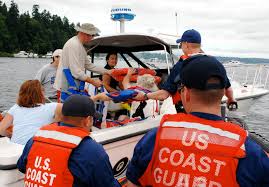
DID YOU KNOW THAT
Unlike any other law enforcement arm, the U.S. Coast Guard (USCG) may board your boat at their discretion — they need no search warrant, no provocation, and no reason other than ensuring your boat is in full compliance with all applicable federal laws and regulations.
I read this article in the Boating Times and thought it would be a good topic to re-explore.
Do you know what to do and say if you see a USCG vessel in the vicinity and hear their voice on VHF channel 16 (or across the water) hailing your vessel and ordering you to bring your boat to a full stop?
You have been stopped by highly trained federal officers who will soon impress you with their professionalism. Before they even step off their vessel onto yours, the very first question they will ask you is, “Without reaching for them or touching them, do you have any weapons on board?” Subtly but powerfully, the tone is set: “I am polite. I am professional. And I mean business.” Let’s assume (and hope) that the answer to that question is “no” since an affirmative answer sets up a scenario outside the scope of this article.
Once your boat is boarded, the officers will be seeking compliance with regulations, starting with those applicable to all boat sizes:
- Your actual registration needs to be aboard and current. If you just have a copy, that’s a problem, but if you have no registration, you have a much bigger problem.
- The Hull Identification Number needs to be the same on your registration and on your boat (embossed into the transom, low on the starboard side). If they don’t match, you’ve got a lot of explaining to do.
- The registration numbers must be at least three inches, appear as a contrasting color to your hull, and be the most forward of any numbering or lettering on the boat.
- If you have a Marine Sanitation Device (aka head or toilet), it must conform to regulations. As Long Island is a “No Discharge Zone,” an over-board, through-hull holding tank must be in the locked/closed position and the key must be under the control of the captain (no exceptions unless it can be seized closed or the handle can be removed in the closed position).